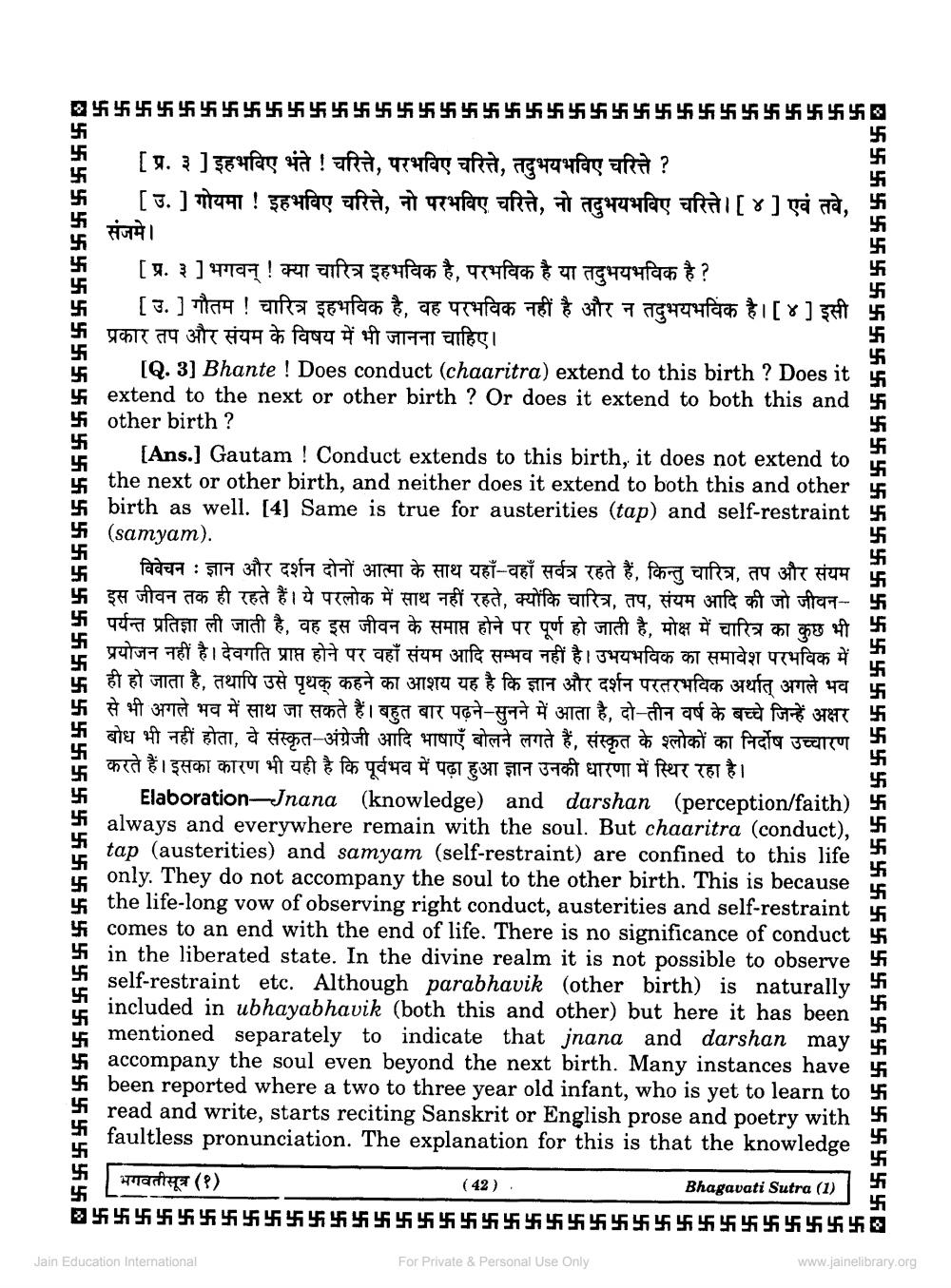________________
फ्र
फ्र
[प्र. ३ ] इहभविए भंते ! चरित्ते, परभविए चरित्ते, तदुभयभविए चरित्ते ?
[उ. ] गोयमा ! इहभविए चरित्ते, नो परभविए चरित्ते, नो तदुभयभविए चरिते । [४] एवं तवे, संजमे ।
[प्र. ३ ] भगवन् ! क्या चारित्र इहभविक है, परभविक है या तदुभयभविक है ?
[उ. ] गौतम ! चारित्र इहभविक है, वह परभविक नहीं है और न तदुभयभविक है। [४] इसी प्रकार तप और संयम के विषय में भी जानना चाहिए।
[Q. 3] Bhante ! Does conduct (chaaritra) extend to this birth ? Does it extend to the next or other birth? Or does it extend to both this and other birth ?
[Ans.] Gautam ! Conduct extends to this birth, it does not extend to
the next or other birth, and neither does it extend to both this and other
5 birth as well. [4] Same is true for austerities (tap) and self-restraint 5 5 (samyam).
卐
卐
卐 विवेचन : ज्ञान और दर्शन दोनों आत्मा के साथ यहाँ-वहाँ सर्वत्र रहते हैं, किन्तु चारित्र, तप और संयम
भी
卐
फ इस जीवन तक ही रहते हैं। ये परलोक में साथ नहीं रहते, क्योंकि चारित्र, तप, संयम आदि की जो जीवन5 पर्यन्त प्रतिज्ञा ली जाती है, वह इस जीवन के समाप्त होने पर पूर्ण हो जाती है, मोक्ष में चारित्र का कुछ प्रयोजन नहीं है । देवगति प्राप्त होने पर वहाँ संयम आदि सम्भव नहीं है। उभयभविक का समावेश परभविक में ही हो जाता है, तथापि उसे पृथक् कहने का आशय यह है कि ज्ञान और दर्शन परतरभविक अर्थात् अगले भव फ 5 से भी अगले भव में साथ जा सकते हैं। बहुत बार पढ़ने-सुनने में आता है, दो-तीन वर्ष के बच्चे जिन्हें अक्षर 5 बोध भी नहीं होता, वे संस्कृत - अंग्रेजी आदि भाषाएँ बोलने लगते हैं, संस्कृत के श्लोकों का निर्दोष उच्चारण 卐 करते हैं। इसका कारण भी यही है कि पूर्वभव में पढ़ा हुआ ज्ञान उनकी धारणा में स्थिर रहा है।
卐
Elaboration Jnana (knowledge) and darshan (perception/faith) always and everywhere remain with the soul. But chaaritra (conduct), tap ( austerities) and samyam (self-restraint ) are confined to this life only. They do not accompany the soul to the other birth. This is because the life-long vow of observing right conduct, austerities and self-restraint comes to an end with the end of life. There is no significance of conduct in the liberated state. In the divine realm it is not possible to observe self-restraint etc. Although parabhavik (other birth) is naturally 卐 included in ubhayabhavik (both this and other) but here it has been mentioned separately to indicate that jnana and darshan may accompany the soul even beyond the next birth. Many instances have been reported where a two to three year old infant, who is yet to learn to read and write, starts reciting Sanskrit or English prose and poetry with faultless pronunciation. The explanation for this is that the knowledge
卐
भगवतीसूत्र (१)
2595959555 5 5 5 5 5 5 5 5 5 5 5 5 5 5 5 5 5 5 5 5 5 5 5 5 55955 5959595 5 5 5 5 595959595952
(42)
Jain Education International
Bhagavati Sutra (1)
फफफफफफफ
For Private & Personal Use Only
卐
卐
卐
www.jainelibrary.org




